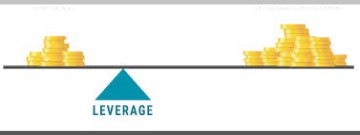
Leverage is the borrowing of additional funds secured against the assets involved in the purchase enabling the acquirer to make previously restricted financial purchases. In the stock market, buying stocks and shares in small private accounts may require the investor to deposit sufficient funds to cover the cost of the entire asset purchase. However, larger or professional accounts may be given access to leverage and thus asset purchases can be achieved using margin.
Because of the risks involved in borrowing funds to purchase a volatile asset, such as stocks, or even derivative contracts, CFD‘s, or FOREX, this functionality is often restricted by brokers only to those who can justify their trading experience or who have sufficient funds to cover the potential losses. Spread betting firms might not be obligated to adhere to the same strict guidelines however. Experienced traders can there use this leverage to increase potential gains by buying more of the asset than their initial capital would allow.
Trading and investment strategies such as merger arbitrage, which may at first appear to be low risk often entice traders to use leverage so as to increase returns. However, following a deal break, or an event such as the coronavirus pandemic using leverage could prove catestrophic to portfolio returns.
Source of Funds
The brokers, subject to certain rules and guidelines are willing to lend the trader theses additional funds because
- With increased funds, traders will spend more on commission thus increasing revenue income to the brokers
- the brokers are able to charge and interest fee on the funds that have been loaned to the trader
- should the trader be executing a pairs trade, the increased sizing maybe require more short selling of a stock, thus requiring more stock to be borrowed which leads to greater fees for the broker
- increased trading may also increase the chance the individual investor trades with the broker itself where the broker offers fractional penny price improvement. Nice work if you can get it.
These incentives for brokers to allow this type of trading and risk taking have led many to question the validity of the rules. There has also been much written about how margin trading leads to stock market bubbles which ultimately end in disaster.
Leverage Example
As an example, we shall use the case of Fitbit (FIT) which is currently subject to a takeover approach from Google.
Shortly after the deal was announced the stock traded at $7.10 (approx). (Merger Arbitrage Limited advised not to get involved 😉 because of a possible investigation of Google’s data privacy actions). This cash deal merger arbitrage spread was offering $0.25. If a trader had $7,100 in their account they could buy 1,000 shares. If the trader was able to utilize “3x” leverage, they could buy 3,000 shares. That is, the traders borrows an additional 200% of their equity and purchases a position “3 times” the size of the original.
Should the deal close at the $7.35, the trader could make,
However, following the announcement of an investigation, the stock declined. Then, following the coronavirus pandemic, the stock REALLY declined. Although it subsequently recovered as the deal moved towards completion, let’s look at the effect on the P&L when the stock hit a low of $5.85.
Therefore, investors looking to make a quick 10% return, or just $750, would at one point in the near future have seen the value of their portfolio decline by more that 50%! This decline may have caused traders to shuffle their portfolios and subsequently “lock-in” this loss. The risk of leverage cannot be understated and we advise traders STRONGLY to fully research their trading strategy before using margin.
